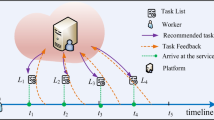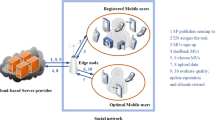Abstract
Mobile crowdsensing (MCS) is a new paradigm for data collection, data mining and intelligent decision-making using large-scale mobile devices. The efficient task allocation method is the key to the high performance of MCS. The traditional greedy algorithm or ant algorithm assumes that workers and tasks are fixed, which is not suitable for the situation where the location and quantity of workers and tasks change dynamically. Moreover, the existing task allocation methods usually collect the information of workers and tasks by the central server for decision-making, which is easy to lead to leakage of workers’ privacy. In this paper, we propose a task allocation method with privacy protection using deep reinforcement learning (DRL). Firstly, the task allocation is modeled as a dynamic programming problem of multi-objective optimization, which aims to maximize the benefits of workers and platform. Secondly, we use DRL for training and learning model parameters. Finally, the local differential privacy method is used to add random noise to the sensitive information, and the central server trains the whole model to obtain the optimal allocation strategy. The experimental results on the simulated data set show that compared with the traditional methods and other DRL based methods, our proposed method has significantly improved in different evaluation metrics, and can protect the privacy of workers.
Access this chapter
Tax calculation will be finalised at checkout
Purchases are for personal use only
Similar content being viewed by others
References
Mnih, V., et al.: Human-level control through deep reinforcement learning. Nature 518(7540), 529–533 (2015)
Cheung, M.H., Southwell, R., Hou, F., Huang, J.: Distributed time-sensitive task selection in mobile crowdsensing. In: Proceedings of the 16th ACM International Symposium on Mobile Ad Hoc Networking and Computing, pp. 157–166 (2015)
Dwork, C.: Differential privacy: a survey of results. In: Agrawal, M., Du, D., Duan, Z., Li, A. (eds.) TAMC 2008. LNCS, vol. 4978, pp. 1–19. Springer, Heidelberg (2008). https://doi.org/10.1007/978-3-540-79228-4_1
Ganti, R.K., Fan, Y., Lei, H.: Mobile crowdsensing: current state and future challenges. IEEE Commun. Mag. 49(11), 32–39 (2011)
Golden, B.L., Levy, L., Vohra, R.: The orienteering problem. Nav. Res. Logist. (NRL) 34(3), 307–318 (1987)
Li, W., Jia, B., Xu, H., Zong, Z., Watanabe, T.: A multi-task scheduling mechanism based on ACO for maximizing workers benefits in mobile crowdsensing service markets with the internet of things. IEEE Access 7, 41463–41469 (2019)
Liu, Q., et al.: A survey on deep reinforcement learning. Chin. J. Comput. 41(1), 1–27 (2018)
Mnih, V., et al.: Playing atari with deep reinforcement learning. Computer Science (2013)
Mnih, V., et al.: Asynchronous methods for deep reinforcement learning. In: International Conference on Machine Learning, pp. 1928–1937. PMLR (2016)
Silver, D., Lever, G., Heess, N., Degris, T., Wierstra, D., Riedmiller, M.: Deterministic policy gradient algorithms. In: International Conference on Machine Learning, pp. 387–395. PMLR (2014)
Tao, X., Song, W.: Task allocation for mobile crowdsensing with deep reinforcement learning. In: 2020 IEEE Wireless Communications and Networking Conference (WCNC), pp. 1–7. IEEE (2020)
Weerdt, M., Zhang, Y., Klos, T.: Multiagent task allocation in social networks. Auton. Agent. Multi-Agent Syst. 25(1), 46–86 (2012)
Author information
Authors and Affiliations
Corresponding author
Editor information
Editors and Affiliations
Rights and permissions
Copyright information
© 2022 The Author(s), under exclusive license to Springer Nature Switzerland AG
About this paper
Cite this paper
Yang, M., Zhu, J., Xi, H., Yang, Y. (2022). Privacy-Aware Task Allocation Based on Deep Reinforcement Learning for Mobile Crowdsensing. In: Wang, L., Segal, M., Chen, J., Qiu, T. (eds) Wireless Algorithms, Systems, and Applications. WASA 2022. Lecture Notes in Computer Science, vol 13473. Springer, Cham. https://doi.org/10.1007/978-3-031-19211-1_16
Download citation
DOI: https://doi.org/10.1007/978-3-031-19211-1_16
Published:
Publisher Name: Springer, Cham
Print ISBN: 978-3-031-19210-4
Online ISBN: 978-3-031-19211-1
eBook Packages: Computer ScienceComputer Science (R0)




